Vegan Chocolate Market Research, 2032
The global vegan chocolate market size was valued at $585.8 million in 2022, and is projected to reach $2 billion by 2032, growing at a CAGR of 13.1% from 2023 to 2032.
Vegan chocolate refers to chocolate products that are free from animal-derived substances and are appropriate for these following a vegan food plan or lifestyle. Traditional chocolate regularly incorporates milk, butterfat, and different dairy products, which are derived from animals. On the contrary, vegan chocolate is made besides any animal products. To create vegan chocolate, producers exchange dairy ingredients with plant-based alternatives. Common substitutes consist of plant-based milk such as almond milk, soy milk, or oat milk. In addition, choice sweeteners like agave syrup, coconut sugar, or maple syrup are used alternatively of standard sugar.
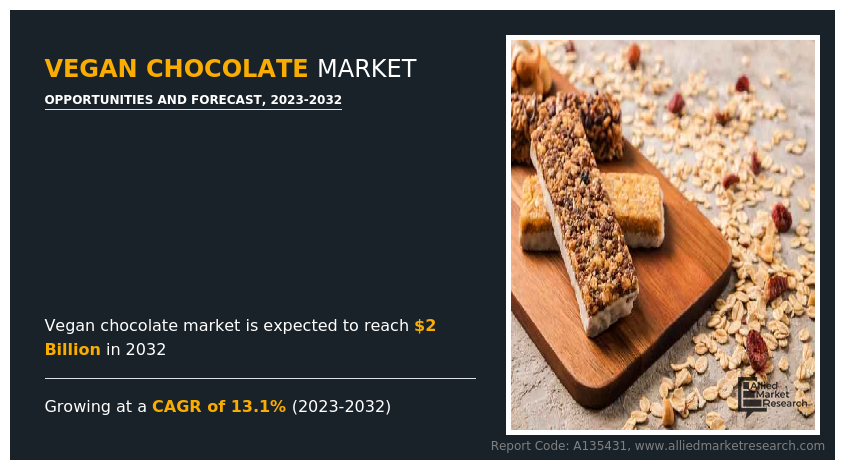
Market Dynamics
There is a growing global awareness about the environmental impact of animal agriculture, specially in terms of greenhouse fuel emissions, deforestation, and water usage. Therefore, human beings are seeking more sustainable choices to usual animal-based products. Vegan chocolate, which avoids the use of dairy and different animal-derived ingredients, presents a greater environmentally friendly choice for chocolate lovers. By selecting vegan chocolate, humans can enjoy a candy treat while aligning with their values and supporting animal welfare. Furthermore, the rising focus on fitness & well being is some other driver behind the growing demand for vegan chocolate. Plant-based diets are regularly related with extra than a few health benefits, which include lower cholesterol levels, decreased risk of heart disease, and improved weight management. Vegan chocolate, normally made with plant-based components and without elements or preservatives, can be perceived as a more healthy choice to typical chocolate.
The production capacity for vegan chocolate may be limited compared to conventional chocolate due to several factors. The demand for vegan chocolate has been growing rapidly but still represents a smaller market share compared to traditional chocolate. Therefore, manufacturers may allocate a smaller portion of their production capacity to vegan options. Moreover, vegan chocolate requires alternative ingredients to replace dairy products such as milk and butter. Sourcing these ingredients in sufficient quantities and at a reasonable cost can be a challenge. For example, finding suitable dairy-free alternatives that provide the desired taste and texture can be more difficult and may require additional R&D efforts. Furthermore, vegan chocolate brands may face challenges in securing distribution in mainstream retail stores. While some specialty stores or health food stores may carry a variety of vegan chocolate options, they may not be as widely available in conventional supermarkets or convenience stores. This limited distribution can restrict the accessibility of vegan chocolate to a broader consumer base.
Innovating in ingredient selection can help create vegan chocolate products that stand out in the market. Incorporating superfoods into vegan chocolate can boost its nutritional profile and appeal to health-conscious consumers. Examples include adding ingredients like chia seeds, goji berries, acai powder, or spirulina, which no longer solely enhance the style however also provide additional health benefits. Furthermore, manufacturers can scan with a number of flavors to create a numerous range of vegan chocolate products. This can include traditional flavors like dark chocolate, milk chocolate alternatives, and white chocolate, as well as unique and exotic flavors like matcha, lavender, chili, or sea salt. In addition, innovation is not limited to the chocolate itself but also extends to packaging and presentation. Brands can invest in eco-friendly and sustainable packaging materials, creative designs, and attractive branding to differentiate their products and appeal to environmentally conscious consumers. By embracing these opportunities for innovation, businesses in the vegan chocolate market can differentiate themselves, attract a broader consumer base, and create unique and enticing products that cater to diverse tastes and dietary preferences. These major factors that are projected to boost the vegan chocolate market demand in the coming years.
Competition Analysis
The key players profiled in the vegan chocolate market report include Alter Eco, MondelÄ“z International, Barry Callebaut, Nestlé, Endorfin Foods, Evolved Chocolate, Chocoladefabriken Chocoladefabriken Lindt & Sprüngli AG, Taza Chocolate, Montezuma’s Direct Ltd., and Endangered Species Chocolate, LLC. Investment and agreement are common strategies followed by major market players. For instance, in February 2022, Lindt, the chocolate company, introduced three new chocolate bars in the UK and Canada. These bars are special due to the fact they are suitable for vegans, that means they don't contain any animal-based ingredients. They are made the use of oat milk instead of regular milk. In Canada, you can discover these bars in three different flavors: original, hazelnut, and salted caramel. In the United Kingdom, there are two flavors available: smooth and hazelnut. This launch came one year after Lindt first entered the market with their HELLO collection of free-from products.
Segment Overview
The vegan chocolate market is segmented on the basis of type, product, distribution channel, and region. By type, the market is divided into dark, milk, and white. By product, the market is classified into molded bars, chips & bites, and boxed. By distribution channel, the market is classified into hypermarkets/supermarkets, specialty stores, online stores, and convenience stores. By region, the market is analyzed across North America, Europe, Asia-Pacific, and LAMEA.
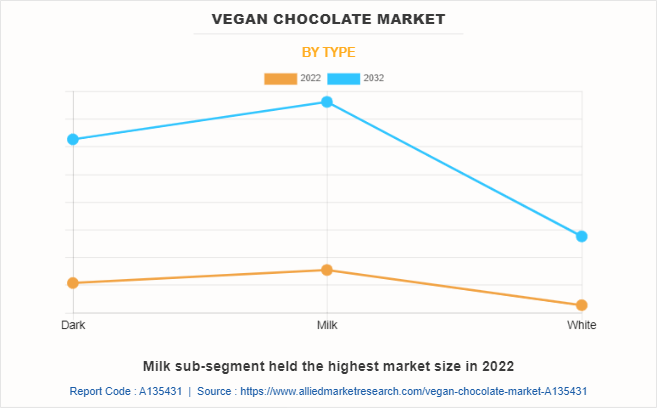
By type, the milk sub-segment dominated the market in 2022. The milk segment in the vegan chocolate market caters to individuals who choose a vegan lifestyle for health or dietary reasons. These consumers may be lactose intolerant, have milk allergies, follow plant-based diets, or have ethical concerns about animal agriculture. By providing milk-like options, vegan chocolate manufacturers can offer a suitable alternative without compromising on taste and texture. Moreover, the inclusion of a milk segment in the vegan chocolate market allows brands to differentiate themselves from competitors. By offering milk-like vegan chocolate, companies can position themselves as providers of a broader range of options, catering to diverse consumer preferences. This differentiation can lead to increased brand loyalty and market vegan chocolate share. Furthermore, many consumers who transition to a vegan lifestyle or have dietary restrictions still crave the taste and texture of milk chocolate. The milk segment in the market aims to cater to these consumers by providing alternatives that closely resemble the creamy and smooth characteristics of traditional milk chocolate. These are predicted to be the major factors affecting the vegan chocolate market size during the forecast period.
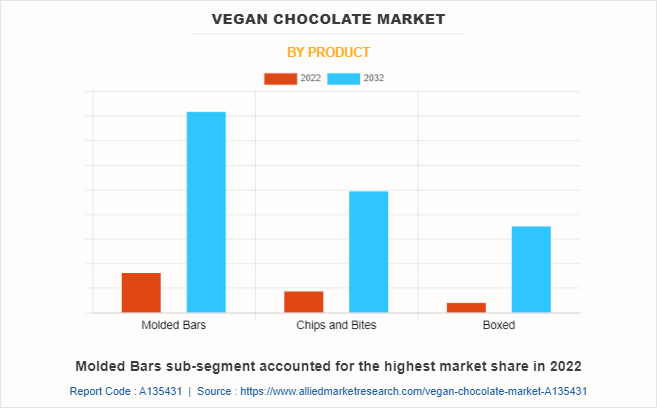
By product, the molded bars sub-segment dominated the global vegan chocolate market in 2022. Molded bars provide a convenient and indulgent choice for customers searching for vegan alternatives to normal chocolate bars. Moreover, many buyers are more and more worried about their fitness & wellness, main them to are searching for out more healthy meals options. Vegan chocolate, along with molded bars, frequently incorporates herbal and natural ingredients, and it is free from animal products, synthetic additives, and allergens, making it an appealing choice for health-conscious consumers. Furthermore, the demand for vegan chocolate is driven by customers who prioritize ethical and sustainable food choices. Choosing vegan products, including molded bars, allows individuals to avoid supporting the use of animal products and reduce their environmental footprint. The availability and accessibility of vegan chocolate products, including molded bars, have increased significantly in recent years. More retailers and online platforms are offering a wide range of vegan chocolate options, making it easier for consumers to find and purchase molded bars.
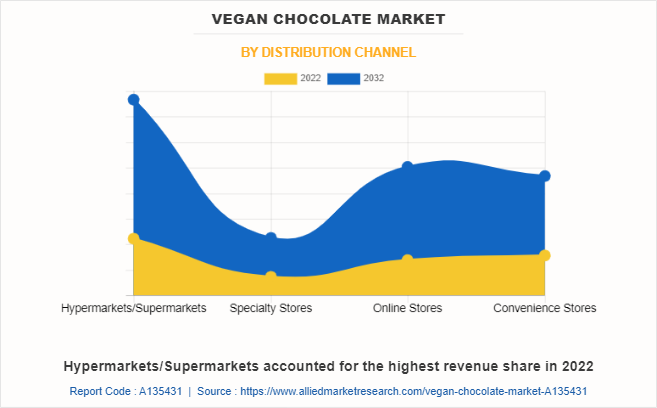
By distribution channel, the hypermarkets/supermarkets sub-segment dominated the global vegan chocolate market share in 2022. Hypermarkets and supermarkets cater to a large customer base, making them ideal platforms to offer a variety of vegan chocolate options. Moreover, consumers are becoming more health-conscious, and they are seeking healthier alternatives to traditional chocolate products. Vegan chocolates, which are often free from animal-based ingredients and additives, are perceived as healthier options, rising their demand in hypermarkets and supermarkets. Hypermarkets and supermarkets offer significant shelf space and visibility for products. Vegan chocolates need adequate exposure to attract potential buyers, and being present in these large retail stores increases their visibility and sales potential. Hypermarkets and supermarkets have the resources to conduct marketing and promotional activities, creating awareness about vegan chocolates and encouraging consumers to try them.
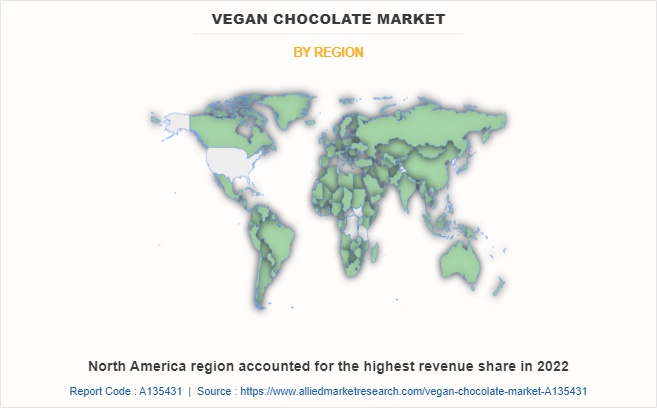
By region, North America dominated the global market in 2022. The growing awareness about the health benefits of plant-based diets has led to a rise in demand for vegan food products, including vegan chocolates. Consumers in North America are more and more adopting vegan life due to issues about animal welfare, environmental sustainability, and private health. This trend has pushed the demand for vegan chocolate as a more healthy choice to ordinary chocolate products. Moreover, the North America market has witnessed a significant shift in customer preferences towards products that align with their moral values and have a decrease environmental impact. Vegan chocolates, which are frequently made with ethically sourced and sustainably produced ingredients, enchantment to buyers who are involved about animal welfare and the environmental consequences of traditional chocolate production. The vegan chocolate market in North America has considered a surge in product innovation and variety. Manufacturers are growing new flavors, textures, and packaging alternatives to cater to the various preferences of consumers. This regular innovation has attracted a wider customer base and contributed to the overall increase of the market in North America.
Key Benefits For Stakeholders
The report provides an exclusive and comprehensive analysis of the global vegan chocolate market trends along with the vegan chocolate market forecast.
The report elucidates the vegan chocolate market opportunities along with key drivers, and restraints of the market. It is a compilation of detailed information, inputs from industry participants and industry experts across the value chain, and quantitative and qualitative assessment by industry analysts.
Porter’s five forces analysis helps analyze the potential of the buyers & suppliers and the competitive scenario of the market for strategy building.
The report entailing the vegan chocolate market analysis maps the qualitative sway of various industry factors on market segments as well as geographies.
The data in this report aims on vegan chocolate market segmentation, trends, and developments affecting the vegan chocolate market growth.
Vegan Chocolate Market Report Highlights
| Aspects | Details |
| Market Size By 2032 | USD 2 billion |
| Growth Rate | CAGR of 13.1% |
| Forecast period | 2022 - 2032 |
| Report Pages | 310 |
| By Product |
|
| By Type |
|
| By Distribution Channel |
|
| By Region |
|
| Key Market Players | taza chocolate, Endorfin Foods, Alter Eco, Evolved Chocolate, Nestlé S.A., Endangered Species Chocolate, LLC., Montezuma’s Direct Ltd., Barry Callebaut, MondelÄ“z International, Chocoladefabriken Lindt & Sprüngli AG |
The rise in veganism and plant-based diets is one of the primary drivers of the vegan chocolate market. People are choosing to avoid animal products for various reasons, including ethical concerns, environmental sustainability, and health benefits. Therefore, the demand for vegan alternatives, including vegan chocolate has surged, which is estimated to generate excellent opportunities in vegan chocolate.
The major growth strategies adopted by vegan chocolate market players are investment and agreement.
Asia-Pacific will provide more business opportunities for the global vegan chocolate market in the future.
Alter Eco, Mondel?z International, Barry Callebaut, Nestlé, Endorfin Foods, Evolved Chocolate, Chocoladefabriken Lindt & Sprüngli AG, Taza Chocolate, Montezuma’s Direct Ltd., and Endangered Species Chocolate, LLC. are the major players in the vegan chocolate market.
The molded bars sub-segment of the product acquired the maximum share of the global vegan chocolate market in 2022.
Vegans and health-conscious consumer industries are the major customers in the global vegan chocolate market.
Growing consumer awareness about the health benefits associated with reducing or eliminating dairy and animal products from their diet has boosted the demand for vegan chocolate. Vegan chocolates are often made from healthier ingredients such as plant-based milk alternatives (e.g., almond milk, coconut milk) and natural sweeteners (e.g., maple syrup, agave nectar) while avoiding common allergens like dairy and lactose, which is estimated to drive the adoption of vegan chocolate.
The number of vegans and vegetarians is steadily increasing worldwide. Vegans avoid all animal products, including dairy and eggs, which are commonly found in traditional chocolate products. Therefore, there is a growing demand for vegan-friendly alternatives, including vegan chocolate which is anticipated to boost the vegan chocolate market in the upcoming years.
Loading Table Of Content...
Loading Research Methodology...


